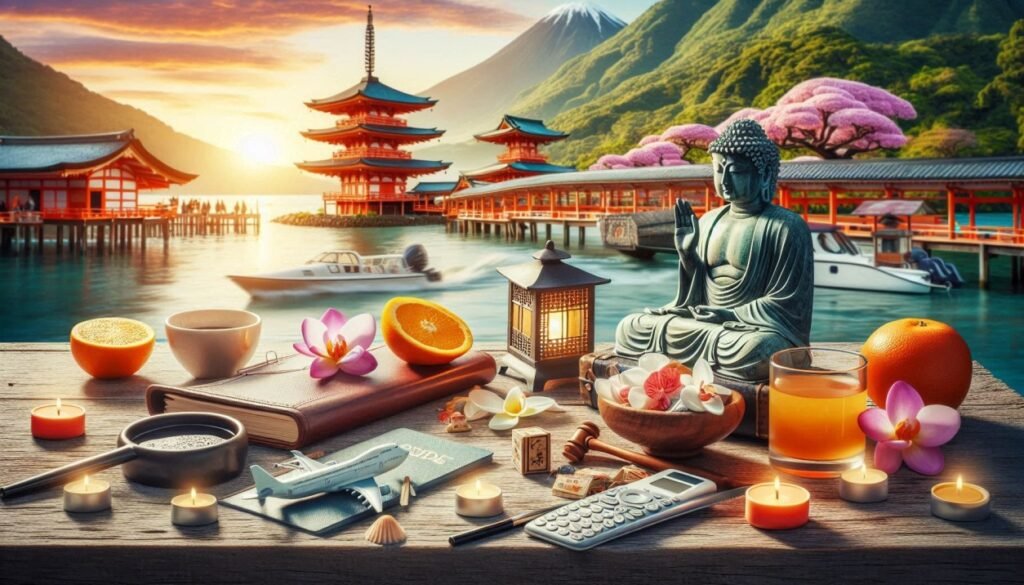Are you feeling stressed, overwhelmed, or burned out by your hectic life? Do you wish you could escape the chaos and find some peace and calm? If so, you might want to consider zen travel as your next vacation option.

Zen travel is a form of travel that focuses on mindfulness, meditation, and wellness. It is not about sightseeing, shopping, or partying, but rather about connecting with yourself, your surroundings, and your inner wisdom. Zen travel can help you relax, recharge, and rejuvenate your body, mind, and spirit.
In this article, we will guide you through the steps of planning and enjoying a zen travel trip. We will also share some tips and tricks on how to make the most of your experience and how to continue the zen travel lifestyle after your trip. Whether you are a beginner or an expert in zen practices, you will find something useful and inspiring in this article. So, let’s get started!
How to plan a zen travel trip
The first step of zen travel is to plan your trip. This might seem contradictory, as zen is often associated with spontaneity and going with the flow. However, planning ahead can actually help you avoid stress and distractions during your trip. Here are some things to consider when planning your zen travel trip:

- Choosing a destination: The ideal destination for zen travel is somewhere that is peaceful, natural, and inspiring. You might want to choose a place that has a rich spiritual or cultural heritage, such as India, Japan, Tibet, or Peru. Alternatively, you might want to choose a place that is close to nature, such as a mountain, a forest, a lake, or an island. You can also look for places that offer zen retreats, workshops, or courses, where you can learn from experts and meet like-minded people.
- Booking a flight: When booking your flight, try to find the best deal and the most convenient time. You don’t want to spend too much money or time on traveling, as that can add to your stress and fatigue. You might also want to avoid flying during peak seasons or holidays, as that can mean more crowds, delays, and hassles. You can use online tools, such as Skyscanner, Kayak, or Expedia, to compare prices and options.
- Finding accommodation: The type of accommodation you choose can make a big difference in your zen travel experience. You might want to avoid hotels, resorts, or hostels that are noisy, crowded, or impersonal. Instead, you might want to look for places that are cozy, comfortable, and serene. You can opt for Airbnb, homestays, or guesthouses, where you can have more privacy and personalization. You can also look for places that offer amenities, such as yoga mats, meditation cushions, books, candles, etc.
- Packing essentials: When packing for your zen travel trip, you want to keep it simple and minimal. You don’t need to bring a lot of clothes, gadgets, or accessories, as they can weigh you down and distract you from your purpose. You only need to bring the essentials, such as comfortable clothes, toiletries, passport, visa, etc. You might also want to bring some items that can enhance your zen practices, such as a journal, a pen, a book, a music player, headphones, etc. You can also download some apps, such as Headspace, Calm, or Insight Timer, that can help you with meditation, mindfulness, and relaxation.
What to do during a zen travel trip
The second step of zen travel is to enjoy your trip. This is where you can practice various zen activities that can help you relax, recharge, and rejuvenate. Here are some examples of what you can do during your zen travel trip:

- Practicing mindfulness: Mindfulness is the practice of being aware of the present moment, without judgment or attachment. It can help you reduce stress, anxiety, and negative emotions, and increase happiness, gratitude, and compassion. You can practice mindfulness in various ways, such as breathing, walking, eating, listening, etc. You can also use mindfulness apps, such as Headspace, Calm, or Insight Timer, to guide you through the process.
- Meditating: Meditation is the practice of focusing your attention on a single object, such as your breath, a mantra, a sound, or a sensation. It can help you calm your mind, enhance your concentration, and deepen your awareness. You can meditate in various ways, such as sitting, lying, standing, or moving. You can also use meditation apps, such as Headspace, Calm, or Insight Timer, to guide you through the process.
- Doing yoga: Yoga is the practice of combining physical poses, breathing exercises, and mental focus. It can help you improve your flexibility, strength, balance, and posture. It can also help you release tension, improve your mood, and boost your energy. You can do yoga in various ways, such as following a video, joining a class, or creating your own routine. You can also use yoga apps, such as Yoga Studio, Down Dog, or Daily Yoga, to guide you through the process.
- Journaling: Journaling is the practice of writing down your thoughts, feelings, and experiences. It can help you express yourself, reflect on your life, and gain insights. You can journal in various ways, such as using prompts, questions, or themes. You can also use journaling apps, such as Day One, Penzu, or Journey, to guide you through the process.
- Reading: Reading is the practice of engaging with written texts, such as books, articles, or blogs. It can help you learn new things, expand your horizons, and stimulate your imagination. You can read in various ways, such as choosing a genre, a topic, or a author. You can also use reading apps, such as Kindle, Audible, or Blinkist, to guide you through the process.
What to avoid during a zen travel trip
The third step of zen travel is to avoid anything that can interfere with your zen experience. This can include things that can cause stress, distractions, noise, or crowds. Here are some examples of what to avoid during your zen travel trip:

- Stress: Stress is the feeling of being overwhelmed, anxious, or worried by something. It can affect your physical, mental, and emotional health. You can avoid stress by planning ahead, setting realistic expectations, and being flexible. You can also use stress management techniques, such as breathing, meditation, or yoga, to cope with stress.
- Distractions: Distractions are anything that can divert your attention from your zen activities. They can include things such as your phone, your laptop, your social media, your email, your news, etc. You can avoid distractions by turning off your notifications, limiting your screen time, and focusing on one thing at a time. You can also use distraction management techniques, such as setting goals, making lists, or using timers, to cope with distractions.
- Noise: Noise is any unwanted or unpleasant sound that can disturb your peace and quiet. It can include things such as traffic, construction, music, conversations, etc. You can avoid noise by choosing a quiet place, using earplugs, or playing soothing sounds. You can also use noise management techniques, such as listening to music, using headphones, or using white noise, to cope with noise.
- Crowds: Crowds are large groups of people that can make you feel cramped, uncomfortable, or unsafe. They can include things such as tourist attractions, public transportation, markets, etc. You can avoid crowds by choosing a less popular place, traveling during off-seasons or off-hours, and booking in advance. You can also use crowd management techniques, such as wearing a mask, keeping a distance, or carrying a backpack, to cope with crowds.
How to make the most of a zen travel trip
The fourth step of zen travel is to make the most of your trip. This means enhancing your experience and maximizing your benefits. Here are some tips and tricks on how to do that:

- Set intentions: Before you start your trip, you might want to set some intentions for what you want to achieve, learn, or change. For example, you might want to improve your health, find your purpose, or overcome a challenge. Setting intentions can help you focus your energy, motivate your actions, and measure your progress.
- Follow a routine: During your trip, you might want to follow a routine that suits your needs and preferences. For example, you might want to wake up early, meditate, do yoga, have breakfast, read, journal, explore, have lunch, rest, do mindfulness, have dinner, relax, and sleep. Following a routine can help you create a sense of order, stability, and discipline.
- Connect with nature: During your trip, you might want to connect with nature as much as possible. For example, you might want to walk in the woods, swim in the lake, watch the sunset, or gaze at the stars. Connecting with nature can help you appreciate its beauty, harmony, and diversity. It can also help you feel more alive, grounded, and inspired.
- Be open-minded: During your trip, you might want to be open-minded to new experiences, perspectives, and people. For example, you might want to try new foods, learn new skills, or meet new friends. Being open-minded can help you expand your horizons, enrich your knowledge, and diversify your network.
- Be present: During your trip, you might want to be present in every moment, without dwelling on the past or worrying about the future. For example, you might want to pay attention to your senses, your emotions, and your thoughts. Being present can help you enjoy the journey, not just the destination. It can also help you cultivate awareness, acceptance, and gratitude.
How to continue the zen travel lifestyle after the trip
The fifth and final step of zen travel is to continue the zen travel lifestyle after your trip. This means incorporating the habits and lessons learned into your daily life. Here are some ways to do that:

- Maintain a meditation practice: After your trip, you might want to maintain a meditation practice that can help you keep your mind calm and clear. You can meditate for as long or as short as you want, depending on your schedule and goals. You can also use meditation apps, such as Headspace, Calm, or Insight Timer, to guide you through the process.
- Be grateful: After your trip, you might want to be grateful for everything that you have experienced, learned, and gained. You can express your gratitude in various ways, such as writing a thank-you note, sending a gift, or making a donation. You can also use gratitude apps, such as Gratitude, Happyfeed, or 365 Gratitude, to guide you through the process.
- Share your story: After your trip, you might want to share your story with others who might be interested or inspired by it. You can share your story in various ways, such as writing a blog, posting a video, or giving a talk. You can also use storytelling apps, such as Medium, YouTube, or TED, to guide you through the process.
Plan your next trip: After your trip, you might want to plan your next trip that can help you continue your zen travel journey. You can plan your next trip in various ways, such as choosing a new destination, booking a new flight, finding a new accommodation, etc. You can also use travel apps, such as Skyscanner, Kayak, or Expedia, to guide you through the process.




